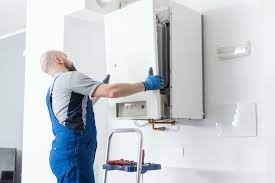
21 Jun Reasons to upgrade a boiler
Energy savings
Most newer boilers offer better energy savings, especially if upgrading from an old model that’s not very efficient.
According to the energy saving trust, central heating boilers are responsible for 60 percent of household energy bills. Having a boiler that is more efficient can have a significant impact on your energy bills. The majority of new condensing gas boilers have an A rating, which means they are 90% efficient or higher. An old, non-condensing unit would have a G rating which could mean that it is only 55%-70% efficient.

Reduce malfunctions and costs
If your boiler is breaking down more often or has strange quirks, it may be time to replace it. This will reduce the likelihood of future problems. For Boiler Installation Cheltenham, visit https://www.hprservicesltd.com/cheltenham-boilers/
Most often, the maintenance costs of newer boilers are lower than those of older boilers. This means that you can save a lot on repairs and service, especially if your boiler has a serious problem.
Smaller size
If you’re looking to save space, replacing an old boiler will allow you to do so.
Boost energy label rating
You can make your home more attractive if you are planning to rent or sell it in the future. A new boiler with improved fuel efficiency is a great way to do this.
A central heating system that is in perfect working order (and therefore gives your home a higher energy label rating) will increase the value of your home, giving you more money.
Quieter boiler operation
New boilers are quieter due to better design and materials.

Change of living situation
If the amount of hot water required changes, you may need a boiler with a higher KW rating to meet the new demand. Installation of a new bath, second bathroom, or rainfall shower can all cause a change in hot water demand.
Improve heating control and a greener home
You can set the temperature of each room independently by using a heating controller with TRVs. The TRVs shut off the radiators when the temperature around the valve reaches a certain level.
TRVs are a great way to improve comfort. After each room has reached the desired temperature, and the radiators in all TRVs are off, a room thermostat placed near a radiator without aTRV can turn off the boiler system. It is a cost-effective way to keep the temperature where it should be.
The TRVs can also be set to a low temperature in rooms that are only used occasionally, such as an extra room for guests. This will prevent the room from being heated unnecessarily.

No Comments